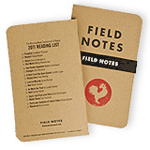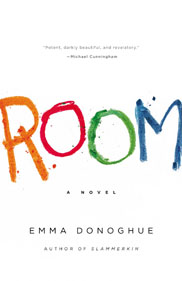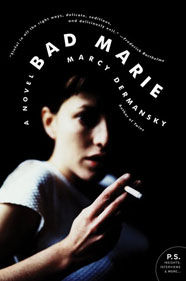-
March 9, 2011
Opening Round
-
Commentary by
Kevin Guilfoile & John Warner
-
Today’s Winner:
2Room
Kevin: Rarely in the Tournament of Books have I read an analysis of two books that so closely mirrors my own opinions. It was actually a little startling to read. I almost don’t know what to write without repeating what Judge Weiner just said, and I don’t think I could say it with more zip.
I know you and I differed slightly on these books. I liked Room a little better than you did and you liked Bad Marie a little better than I did. The first maybe I can attribute to the fact that I have two boys, one just a little younger and one just a little older than Jack is in the novel. I read the book in two sittings and probably cried six times. I should point out that I also cry during Hoosiers as well as Buffy reruns on Logo, but I was seriously moved by Room, and I rarely felt manipulated. Their escape from captivity was about as harrowing as anything you’d get in an action thriller, although every scene after that, while often interesting because of your intense investment in the characters, is anticlimax. Everything happens a little too easily. The bad guy is captured quickly and we’re assured he’s going to jail forever. The hospital staff is really nice. There are some minor family issues, but after their intense, years-long ordeal, they have a relatively soft landing in the real world.
Donoghue stops being cruel to her darlings and the stakes are dramatically reduced. The one time either of them seems to be in any peril it is resolved very quickly and without an afterthought. Nevertheless when I turned the last page, all was forgiven. I really liked this book a lot.
I’ve always said that critics of literary fiction make way too much of coincidence in novels. It is to the point sometimes that I think some young fiction writers have become so allergic to coincidence that nothing surprising ever happens in their novels at all. In real life, though, “that was an unbelievable coincidence” is nearly synonymous with “I have a great story to tell you.” For Shakespeare and Dickens and Austen the unlikely coincidence was practically their canvas.
The two coincidences that start Bad Marie are almost crippling to the novel, however. The first, as Judge Weiner describes, is that Marie seeks out her old childhood friend in New York, with whom she has had no contact for years, and discovers that she happens to be wed to the author of her favorite obscure French novel. Then when Marie and said author run away to Paris with Caitlyn, they happened to be seated next to not just a movie actress, but one with whom the obscure French author had a sexual relationship years ago, and who has been pining for him ever since. It’s all so flimsy you can feel the author’s hand on every page. At one point in the story, Marie boards a train and thinks to herself that she half expects her lover and the movie actress to be on the train and the reader is thinking, “Me too, because only about five people exist in the world of this book!”
 Buy anything from Field Notes from now until the end of the ToB and receive a special “reading list” memo book free, while they last. Use coupon code ROOSTER.
Buy anything from Field Notes from now until the end of the ToB and receive a special “reading list” memo book free, while they last. Use coupon code ROOSTER.As Judge Weiner says, though, the book is rescued by the finely drawn relationship between Caitlyn and Marie, which is genuinely touching.
John: Everyone is on target here. Jennifer Weiner has written one of the best judging commentaries in the history of the tournament. And I can’t really dispute what you have to say about the coincidences at the heart of Bad Marie. But here’s the thing: I don’t care. I couldn’t put Bad Marie down. It was the most fun I had reading all year.
I have to think Marcy Dermansky is well aware of these coincidences that kick off her novel, and she obviously doesn’t care either, so why should I? The novel is going to work on its own “logic,” one rooted (as Dermansky notes in the aftermatter) in French cinema, so while I’m wary of forgiving something just because the author asks us to, in this case, I’m more than willing.
Each twist, each escalation, I was exclaiming out loud, “no way!” and furiously clicking “Next.” (I read it on the Kindle.) I’d say that the book has a lot of balls, but that wouldn’t be gender correct in this case, so instead I’ll say that Bad Marie was written by someone with big, brass ovaries.
I actually had a hard time putting Room down as well, as their time in the room is about as gripping as anything I’ve read since Bad Marie, but for me, it doesn’t make up for a novel that falls off a cliff after the escape. I think Donoghue gave herself a pretty impossible task, and probably did about as well as she could, but by the end, I was pretty sure this was a better novella than a novel.
Kevin: I never wanted to put Bad Marie down, and I read it in just a couple of days. It was one of those reading experiences where I probably should let go of the stuff that bothers me intellectually or structurally or whatever. What difference does it make as long as I’m enjoying the read? Certainly the more rational way to approach a novel is to ask first, Did I enjoy it? instead of What’s wrong with it? I think sometimes the part of our brain that likes to nitpick a book’s faults—the part that is showing off to prove to you just how smart you are—shouts louder than the part of the brain that is quietly enjoying the ride. It doesn’t mean we should listen more closely to it.
While I appreciate (and even enjoy) the argument, I’m not sure about the conclusions that Weiner reaches at the end of her judgment. It’s hard to claim that Emma Donoghue was overlooked by the media this year. Room received not just two New York Times reviews, but also landed on the cover of the New York Times Book Review. It was a Best of the Year pick by the Times and the New Yorker. It was shortlisted for the Booker Prize. On Sept. 28, CNN named Donoghue one of its “Most intriguing people of the week” along with the Dalai Lama. I’m not sure what kind of respect and attention Judge Weiner thinks Emma Donoghue isn’t getting because of her girl parts.
Which is not to dismiss the idea of gender bias in the literary world. I think even just on an intuitive level, everyone in publishing knows it exists and I welcome Jennifer Weiner’s entertaining and important efforts to spark both discussion and soul-searching on the matter. Room might be the wrong flag to march behind, though.
John: The gender bias in the publication and prestige outlet reviewing of literary fiction is undeniable, as evidenced by the VIDA numbers. The response by the big-time cultural gatekeepers to these numbers ranged from thoughtful to obtuse. Outside the literagencia, there’s been some fascinating soul searching.
As someone inclined to cheer on anyone who’s going after cultural elitism, I had no problem with Jennifer Weiner and Jodi Picoult sparking the Franzenfreude discussion. (I did have a problem with the moniker, though, because there was no misfortune of Franzen’s to take actual pleasure in.)
But as you say, it’s not quite so simple. Recently, both Karen Russell (Swamplandia) and Alison Espach (The Adults) received the double Times treatment. A woman has been fiction editor of the New Yorker for eight-plus years. Two out of three of the daily Times reviewers are women. Oprah Winfrey has chosen male authors for her book club 14 times in a row and 18 out of the last 20. Whatever is going on isn’t just a function of the phallocracy of publishing.
It’s also interesting to note that in the marketplace, these cultural gatekeepers seem to have very little sway. Part of this is because so-called literary fiction, which is what these publications primarily cover, does not sell. Of the top 100 best-selling books from last year, the highest-ranked literary fiction title is The Help at no. 8. We have to go all the way down to 39 to find Freedom.
Jonathan Franzen was outsold by four different titles in the Diary of a Wimpy Kid series, and all five of the Percy Jackson and the Lightning Thief books. Maybe that’s the Franzenfreude we’re looking for.
Kevin: Statistics lie, John. For instance, statistics will tell you that 536,211 people are better than me at Angry Birds. Freedom was released in the second half of the year, so its numbers should probably be adjusted—it might even rank higher on next year’s list. Still, the appearance of so few literary titles in the top 100 is striking and it probably tells us that “attention that leads to sales” (as Judge Weiner qualified it) might be something of a white whale. In fact, if anyone in publishing could identify exactly what kind of attention that was, they would immediately be submerged in a tank of spinal fluid on the 20th floor of the Random House offices and wired up like the precogs in Minority Report.
So let’s look at men vs. women in the top-40 bestsellers of 2010, regardless of genre. I count five female novelists (there are a few more books than that, as Suzanne Collins and Stephenie Meyer have multiples) vs. 10 male (not counting Decision Points as a work of fiction), a significant testicular bias. Franzen is the only literary novelist in the top 100 with a book published for the first time in 2010, so that’s a problem. The others who would qualify are Stockett, Alice Sebold, Harper Lee, J.D. Salinger, and Sara Gruen. So among 2010 blockbuster bestsellers, female literary novelists born after Prohibition seem to have it over on their male counterparts by an extremely unscientific 3-1.
As you point out, the truly alarming stat is the small sample size.
Impressively, Judge Weiner appears on the list at no. 95, edging both the overtestosteroned Tom Clancy and the sexually ambiguous Elf on the Shelf. She was also one spot behind our old punching bag, Nicholas Sparks. Grrr. She’ll get him next year.
Also, I’m not saying that I’m part of the problem, but the two movies at the top of my Netflix queue are Hot Tub Time Machine and Space Chimps.
Up tomorrow, we have author and TMN and ToB co-founder Rosecrans Baldwin weighing in on a match between Savages, a violent, lightning-paced, neo-noir drug novel, and The Finkler Question, the Booker-award winning comic meditation on Jewish identity.
Everybody who had read both those books before the ToB raise your hands.
Kevin Guilfoile is the author of two acclaimed novels, Cast of Shadows and The Thousand, which have been translated into more than 20 languages.
John Warner’s novel, The Funny Man, will be released late September of this year by Soho Press. For the time being, he teaches at Clemson University.

















